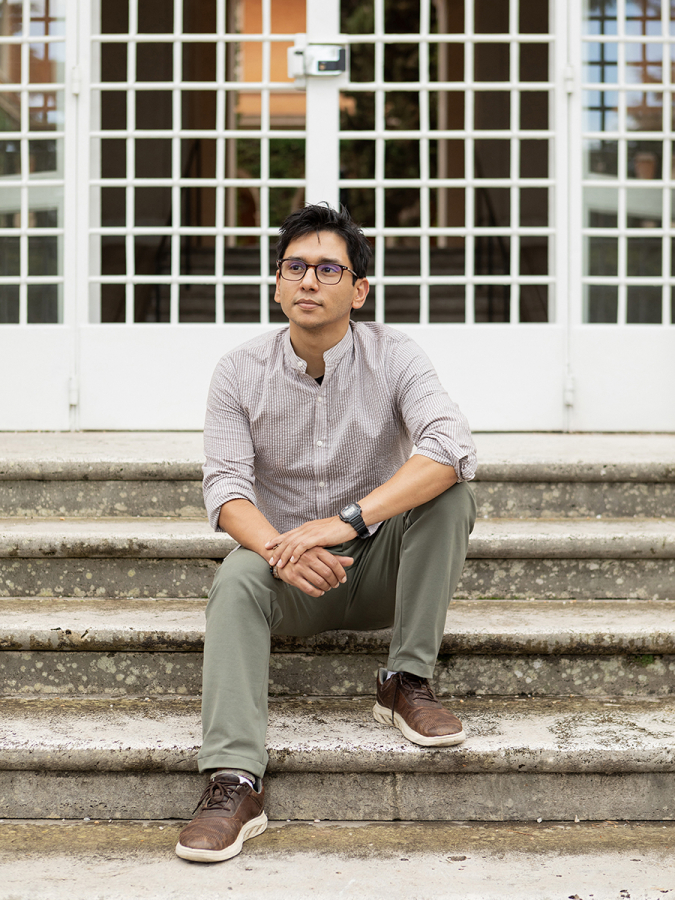Giancarlo Tursi is the 2025 Andrew W. Mellon Foundation Rome Prize Fellow in modern Italian studies and assistant professor of translation studies in the Department of French and Italian at the University of California, Santa Barbara. His project examines partial to complete dialectal translations of The Divine Comedy during Italy’s unification era. Given that only 2.3 percent of Italians spoke the standard language, these translations may have promoted national integration or, alternatively, served local interests, recalling Dante’s choice to write in Tuscan over Latin. The study presents Italy as a “nation-in-translation,” revealing the complex role of language in shaping national identity.
Tursi spent a few moments answering a few questions from the Academy.
What have you been working on while at AAR?
I’ve mostly been working on my book manuscript, drawn from my doctoral dissertation, on the phenomenon of dialectal translations of Dante’s Divine Comedy in nineteenth-century, unification-era Italy. I’ve also been occupied with an article on the use of dialect in the novels of Elena Ferrante and a special issue on sound and translations I’m coediting for the journal Sound Studies.
Has your project changed since arriving?
I’ve been talking with another fellow, Katherine Beaty, who works on Renaissance book-binding, about the possibility of compiling some of the dialectal translations I’ve found in the archives into an artistic book of some sort. There was a fantastic Academy exhibition in the fall entitled Artists Making Books that really inspired me. The idea would be to leave something behind in the library that future readers can peruse. “It’s the year of the book!” as librarian Paolo Imperatori exclaimed to me when I told him about the idea.
I did not expect to be so inspired by the artists and writers here.
What was your most surprising discovery?
As a scholar of the Risorgimento, it felt serendipitous to find out that the hill we reside on was the site of the 1848 battles between the Garibaldian troops and the French-backed papacy. Many of the streets are named after fallen soldiers. There is an amazing statue of Garibaldi astride a horse overlooking all of Rome (truly one of the best views).
What have you seen in the city of Rome that has made a strong impression on you?
I already mentioned the Garibaldi overlook. Nearby Villa Pamphilj is breathtaking for a walk or run. All of central Rome is great but sometimes I find the environs of the Academy to be the most charming. The views from my second floor and the communal kitchen, not to mention the balcony on the fourth floor, are absolutely stunning. Also small, unexpected things like walking around the garden in the back or finding a basketball court in Quattro Venti, or making friendly with the cats on my way down to Trastevere (my favorite route is through the Spanish Academy steps).

How have your interactions with this year’s fellows and residents influenced your work or changed your perspective?
I partake in the lunches and dinners as much as I can. Some find that the daily schedule of meals interrupts their work, but I find that it punctuates it, gives it rhythm (and what is rhythm if not interruption, I say). I’m also fascinated by the rhythms the different categories of fellows, visiting scholars and artists, residents, etc., create. Their comings and goings regulate the calendar and indicate, alas, the passing of time.
How did your conceptions of the Academy change over the course of the fellowship?
I found it more genuinely convivial and down-to-earth than I expected. In an era of cutthroat one-upmanship, I consider this a renegade way of being.
What is coming up in the next few months?
I’ll use the metaphor of rhythm once more. Having just passed beyond the Janus-faced halfway point of my fellowship in January (after which god, I learn from my partner Emily Lord-Kambitsch, a classicist who’s here with me, the hill on which we’re located, the Giannicolo, is named), I can’t help but recalibrate my goals and priorities. It’s easy to get cozy in the (seemingly) endless reverie of the Academy. I would like to get out more, consult more archives, take day trips to neighboring cities during the weekends. I’m also thinking about getting a bike (Rome can be difficult to navigate via bus or on foot). Hopefully this book project idea with Katherine will work out. The manuscript will get done. But I would also like to do something else more personal, like keep a journal or write a story, to immortalize the time. Perhaps this is a start.